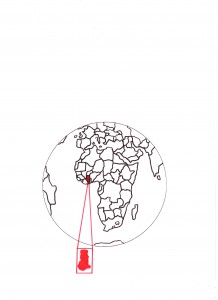GHANA
A. THE COUNTRY
The Republic of Ghana, in West Africa, is home to Lake Volta, the
largest man-made lake in the world. Government is a multiparty
democracy and Ghana plays a positive regional and continental role in
diplomacy and peacekeeping. Ghana is an example of how a multi-ethnic
and multi-faith nation is West Africa can remain largely at peace.
Agricultural products (especially cocoa and timber), gold and tourism
are the main revenue sources. A new lake and hydro-electric project on
the western border are being developed. A fertile and once-prosperous
land with rich natural resources, Ghana now struggles with poverty and
continues to receive foreign aid. The once-rich tropical forests have
been overlogged, and soil degradation and unreliable rainfall impoverish
northern farmers, promoting migration.
B. THE PEOPLE
The population is ~25,500,000 and official language English. There are
about 100 ethnic groups. ~69.2% are Guinean/Kwa, ~25.6% Gur, ~1.64%
Yoruba, ~3.6% Other (Bissa, other African, Westerner, Asian).
Over 40% of the population are under age 15. While now illegal, as many
as 20,000 girls are enslaved by fetish priests who wield significant
spiritual power. Street children number over 30,000.
C. RELIGIONS AND CHRISTIANITY/PENTECOSTALISM
Traditionally peaceful relations among Christians, Muslims and
ethno-religionists seem to now hang in the balance with aggressive
outreach by Muslims. Widespread overlaps of religious practices and
beliefs, and contradictory claims of numbers of those committed, make
exact measurements of affiliates impossible.
~63.4% claim to be Christian, ~23.79% Muslim, ~12.5% Ethnoreligionist,
~0.21% Non-religious, ~0.1% Baha’i.
In the Christian category:
~25.74% are Protestant, ~22.15% Independent, ~12.04% Catholic, ~1.25%
Anglican, ~0.66% Unaffiliated.
Evangelicals represent ~24.2% of the population.
Charismatics represent ~23.1% and of those ~19.9% are Pentecostals.
References:
http://en.wikipedia.org
Operation World, Jason Mandryk. Colorado Springs: Biblica Publishing, 2010

